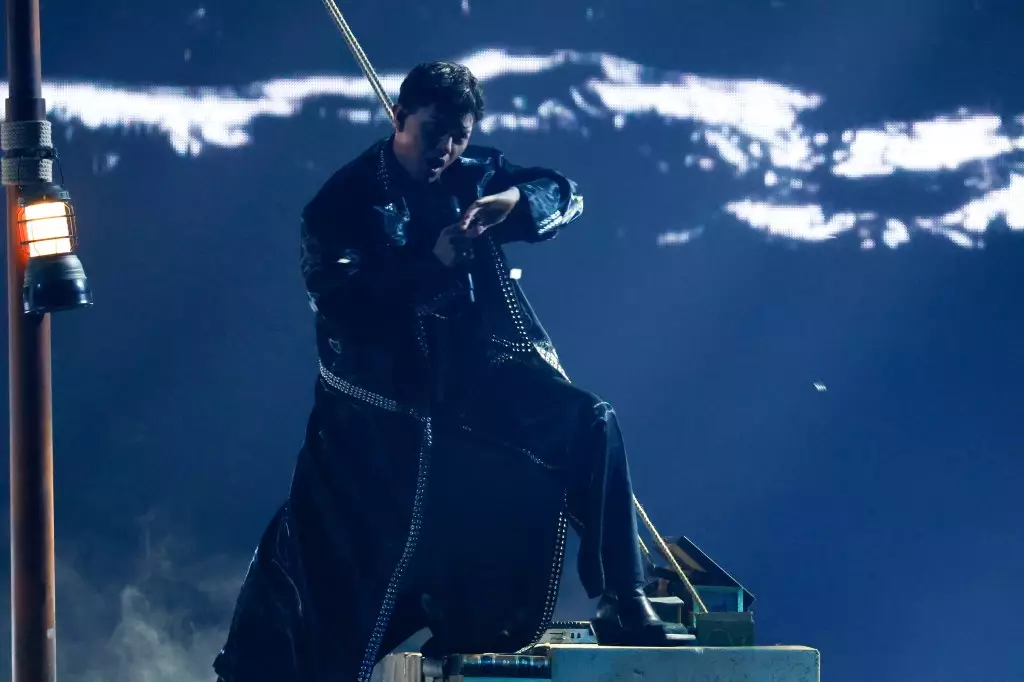The 69th edition of the Eurovision Song Contest, an illustrious event that unites nations through music, reached its zenith in Basel, Switzerland. This year’s grand finale, held in the breathtaking St. Jakobshalle arena, witnessed a dramatic celebration as JJ from Austria took center stage, transforming a mere competition into a poignant emotional journey. His heartfelt performance of “Wasted Love” resonated deeply with audiences, showcasing not only his vocal prowess but also the emotional depth that lies behind the lyrics. As confetti descended like a tender embrace, the aura of triumph enveloped him, accentuated by a techno remix of his ballad that sent the audience into an ecstatic frenzy, marking a moment of modern celebration.
A Contest of Surprises
The road to victory was anything but predictable this year. From the onset, there was fierce rivalry, particularly between Austria and Switzerland, whose standings fluctuated chaotically as national juries cast their votes. Despite being considered front-runners, countries like Sweden, Finland, and France observed anxiously as the unexpected emerged. The real shocker came when Israel sprinted past favorite nations, accruing an impressive 297 viewer votes, only to narrowly miss the target that ultimately crowned Austria victorious by a margin of 79 points. Meanwhile, the host, Switzerland, faced an unprecedented blow, finishing with a paltry zero points. This dramatic turn of events not only reflects the unpredictable nature of Eurovision but also keeps its audience passionately engaged year after year.
The Global Anthem of Unity
Eurovision is much more than a singing competition; it is a vibrant festival that celebrates cultural diversity. Each of the 37 participating countries adorned the stage with spectacular performances infused with elaborate light displays, intricate staging, and dynamic choreography. Viewers perched before their screens were not just passive observers; they became active participants wielding their voting power, which recognizes the very heart of the contest—music’s capacity to bridge gaps between nations. Since 2021, Peacock has brought this global celebration to American audiences, further amplifying the reach of Eurovision’s powerful message of unity through melody.
A Historic Return to Roots
May 13 marked the commencement of this year’s semi-finals, culminating in a memorable finale where the spirit of Eurovision reverberated through Switzerland. In a touching pre-recorded message, 1988 Swiss winner Celine Dion celebrated the return to the contest’s birthplace, reflecting on the historical significance of the event that kick-started her career. This return feels particularly symbolic, considering the current global climate, where joy and connection through music are essential. Dion’s struggle with a neurological disorder highlights the fragility of life and the enduring power of music to transcend adversity.
Controversy Amidst Celebration
Yet, amidst the glittering performances and jubilant atmosphere, there loomed an undercurrent of controversy. The participation of Israel sparked discussions that tore at the heart of the contest’s unifying ideology. With RTÉ advocating for a debate on whether Israel should continue to compete, and over 70 former Eurovision performers signing an open letter urging a ban, the conversation surrounding the contest’s inclusivity becomes critical. Director Martin Green’s thoughts on maintaining Israel’s status as a contestant reveal a complicated resolution that seeks to balance art with advocacy. His belief in music as a catalyst for coexistence invokes a romantic ideal, suggesting that perhaps, even in the midst of turmoil, unity forged through song is achievable.
A Look to the Future
As 2023’s Eurovision fervor settles, the anticipation for future contests looms large on the horizon. The excitement of millions who witness this festival of song is a testament to its enduring legacy. The emotional resonance sparked by performers like JJ speaks to an innate human desire for connection, tell a story, and share shared experiences through the universal language of music. Eurovision is not merely a competition—it is a collective expression of hope and a celebration of humanity in all its glorious diversity.
